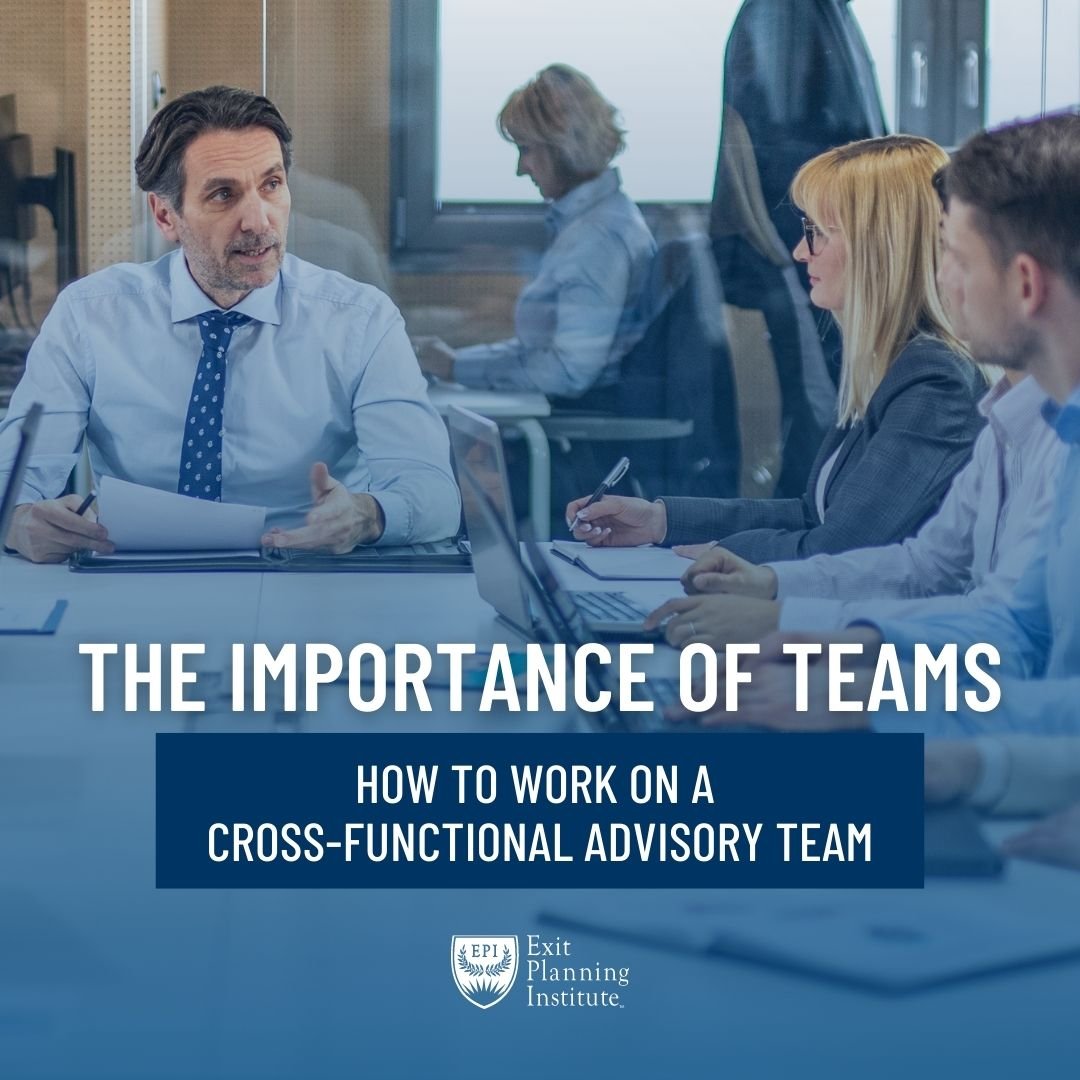
THE EXIT PLANNING BLOG
Keep up-to-date with exit planning, succession planning, industry trends, unique specialty insights, and useful content for professional advisors and business owners.
Share this
Is Your Advisor Qualified to Talk Exit Planning?
by Colleen Kowalski on September 24, 2021

As a business owner, you work with a large team of advisors, mentors, business professionals, and confidants. Each member of your team manages a specific component of your business, financial, and personal life goals. When it comes time for you to exit your business, sell your assets, or transition your business to the next generation, who do you trust to guide you through that process?
Are your advisors prepared to walk you through the business exit process? Do they know the best ways to incorporate planning for your next act into your exit strategy? Exit Planning is not a one size fits all approach. Your advisor might say, “Yeah, I can help you sell your business.”
But, do you know if they are qualified to talk about exit planning?
Why Is a Qualified Advisor Important to Your Success?
As a business owner, 80% of your wealth is locked in your business. Unless you are able to successfully harvest that value, you will never lead the post-business life you had envisioned. A qualified exit planning advisor will be able to guide you through your business, personal financial, and personal goals and needs to allow you to sell your business for the multiple you want.
It can be difficult to differentiate a qualified advisor from the field of consultants and executive coaches. We recommend searching for specific experience and industry-specific credentials. The Certified Exit Planning Advisor (CEPA) Credential is the perfect credential to look for when investigating exit planning advisors for your business. CEPA credentialed advisors offer business owners ways to create greater efficiencies within their company, maintain a better work/life balance, and build owner-independent businesses.
Red Flags to Look For in Your “Exit Planning” Advisor
Has a One Size Fits All Exit Plan
No two businesses are the same, so it stands to reason that no two exit plans should be the same either. However, some advisors have one type of exit plan that they present to all owners. A comprehensive exit strategy is more beneficial for business owners than a one-size-fits-all “plan” that an advisor utilizes with all business owners regardless of their individual personal and financial goals. While the general topics covered in an exit plan can be translated to more than one business, without knowing how to tailor the strategy to specific owner needs, advisors are not suited to work in exit planning.
Fails to Take Your Personal Goals into Account
A good exit plan incorporates an owner’s business, financial, and personal needs into account. However, some advisors spend the majority of their time ensuring the business needs are met without ensuring that the business owner will have a fulfilling post-business life. Without planning for the owner’s personal goals, the exit plan falls short of success. While the business might have grown in value, failing to provide the exited owner with a valuable personal plan diminishes the success of the overall exit.
Only Presents One Exit Option as Possible
If an advisor only presents one exit option as a possibility for an owner’s business, they are not prepared to give the owner the best value in their business exit. Not all businesses are suited for a “Sale to a Third Party” exit plan. At Exit Planning Institute, we provide advisors and owners with education surrounding eight internal and external exit options. Each of these options must be discussed with an advisor to confirm which exit strategy an owner is interested in. In family businesses especially, an advisor must be prepared to handle the nuances that exist in determining if the business will be passed to the next generation.
Advisor Has No Formal Education in Exit Planning
While professional advisors have an advanced education surrounding specific business practices, without formal training and certification in exit planning specifically, they fail to incorporate key elements in an owner’s exit plan. For example, owner’s in our State of Owner Readiness reports have stated that a CPA is their “Most Trusted Advisor”, but without being well-versed in the holistic exit planning process, a CPA would not be best suited to help an owner with their exit plan.
Advisors with formal education on exit planning are better equipped to assist owners in building valuable companies. Exit planning advisors also provide insights into creating stronger personal financial plans and aligning business owner’s personal goals. The Certified Exit Planning Advisor credential allows advisors to have more holistic conversations and adds value to an advisor’s current skill set.
Do your advisors have any of these Red Flags? We curated a list of questions to ask your advisory team about Exit Planning before proceeding with your professional relationship. Exit Planning is one of the most important business decisions you will ever make. Make sure you have the correct team in place for this process.
Download our “Questions to Ask Your Exit Planning Advisor” Checklist today!
Request the Checklist!Share this
- Blog (547)
- CEPA (429)
- exit planning (249)
- CEPA community (188)
- Business Owner (173)
- Exit Planning Summit (99)
- EPI Chapter Network (89)
- Value Acceleration Methodology (81)
- Exit Planning Partner Network (76)
- EPI Announcement (50)
- Content (48)
- Webinars (37)
- Excellence in Exit Planning Awards (34)
- Marketing (30)
- 2024 Exit Planning Summit (28)
- 5 Stages of Value Maturity (26)
- Books (24)
- EPI Academy (24)
- EPI Team (22)
- Exit Planning Teams (22)
- Leadership (21)
- 2023 Exit Planning Summit (20)
- family business (20)
- women in business (19)
- Intangible Capital (18)
- Exit Options (17)
- Black Friday (16)
- CPA (15)
- Walking to Destiny (15)
- Chapters (14)
- State of Owner Readiness (14)
- Chris Snider (12)
- National Accounts (12)
- Small business (12)
- charitable intent (12)
- personal planning (12)
- Financial Advisors (11)
- Season of Deals (9)
- 5 Ds (8)
- About us (8)
- Podcast (8)
- Scott Snider (8)
- Insiders Bash (7)
- Christmas (6)
- Exit Planning Content Library (6)
- Case Studies (5)
- Owner Roundtables (5)
- Three Legs of the Stool (5)
- Value Advisors (5)
- financial planning (5)
- Awards (4)
- Circle of Excellence (4)
- EPI Thought Leadership Council (4)
- Exit & Succession (4)
- Five Ds (4)
- executive training (4)
- Owners Forum (3)
- author (3)
- forbes (3)
- DriveValue (2)
- Exit Is Now Podcast (2)
- Peter Christman (2)
- Veteran (2)
- Whitepapers (2)
- Annual Exit (1)
- Business Owners Forum (1)
- SOOR (1)
- business consultants (1)






